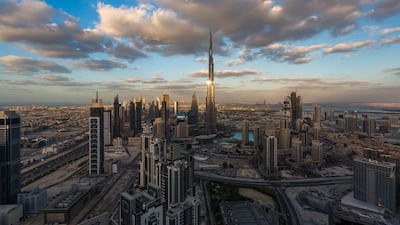Dubai’s non-oil private sector economy continued to improve in September as demand rebounded from the coronavirus-induced slowdown.
The seasonally adjusted IHS Markit Purchasing Managers' Index reading climbed further above the neutral 50 mark for a third consecutive month to hit 51.5, compared with 50.9 in August. A reading above 50 indicates an expansion.
“September PMI data finalised a third-quarter period of modest economic recovery in Dubai,” said David Owen, an economist at IHS Markit.
“The PMI has consistently remained above the 50 no-change mark since July, as business activity grew [with] the easing of Covid-19 restrictions.”
Both output and new business across the private sector registered solid improvement during the period, according to the survey.
The rate of sales growth was at its strongest in 10 months, driven by reports of higher client demand and new projects as more economic activity resumed.
The wholesale and retail sector recorded another sharp rise in new orders during the month and this fuelled a modest rise in construction work in the emirate.
However, the travel and tourism sector, which was hit hard by the pandemic, continued to soften, albeit at its slowest pace since February.
Dubai, the commercial and trading hub of the Middle East, has removed most restrictions put in place earlier this year to contain the spread of the virus, which had killed more than a million people around the world as of Sunday, according to Worldometer.
The emirate is now open to international tourists and malls and restaurants are observing strict hygiene and social distancing rules.
Dubai unveiled several measures over the past few months to help the economy and businesses recover and the size of government support stands at Dh6.3 billion ($1.7bn).
Although companies in the emirate continued to cut prices in September to boost sales, the rate of discounting was slower compared with the previous month, according to the PMI survey.
However, output levels expanded “solidly for the fourth month in a row”, as companies continued to push to return commercial activity back to pre-pandemic levels.
There were further job cuts as some companies reduced staff to cut expenses. However, the fall in employment last month was the weakest in seven months.
Expectations of further growth in the coming year increased at the end of the third quarter, fuelled by a recovery in sales due to the easing of virus-related restrictions.
However, companies remain cautious as Covid-19 cases rise and will be “wary of expanding too much or too quickly”, Mr Owen said.
The number of infections in the UAE rose to 105,133 on Saturday, with 95,973 patients having recovered so far, according to the country's Ministry of Health.
Dubai’s continued economic recovery mirrors that of the entire country. The UAE's headline PMI reading hit an 11-month high last month when it rose to 51, up from 49.4 in August.
The overall improvement in business conditions marked a renewed expansion in the non-oil private sector of the country at the end of the third quarter.
Rising activity levels were supported by a solid increase in new business, a rebound in consumer demand and higher export sales for only the second time in eight months.


